- Home
- Jon McGregor
Reservoir 13 Page 2
Reservoir 13 Read online
Page 2
At the butcher’s for May Day weekend there was a queue but nothing like there once would have been. Nothing like the queue Martin and Ruth needed to keep the shop going. Martin had been keeping this to himself, although it was becoming obvious and nobody asked. Irene was at the front of the queue telling everyone what she knew about the situation at the Hunters’. She did the cleaning there, and knew a thing or two. You can imagine what it’s like for the girl’s parents, she said. Having to watch us all down here just getting on with things. Ruth saying but surely the village couldn’t be expected to put life on hold. Austin Cooper came in with copies of the Valley Echo newsletter and laid them on the counter. Ruth wished him congratulations, and he looked confused for a moment before smiling and backing away towards the door. Irene watched him go, and asked if Su Cooper was expecting. Ruth said yes, at last, and from the back of the queue Gordon Jackson asked would there be any chance of getting served before the baby was born. A breakdown truck came slowly down the narrow street, with a red LDV Pilot van hoisted on the back and a police car following. The van was wrapped in clear plastic. Martin wiped his hands on his apron and stepped outside to watch it pass. Gordon came out with him and lit a cigarette. Martin nodded. That changes things, he said. Fucking breakthrough is that, Gordon said. The swallows returned in number, and could be seen flying in and out through the open doors of the lambing shed at the Jacksons’ and the cowsheds over at Thompson’s, and the outbuildings up on the Hunters’ land. The well-dressing committee had a difference of opinion about whether to dress the boards at all this year. Under the circumstances. There’d never been a year without a well dressing that anyone could remember. But there’d never been a year like this. In the end it was agreed to make the dressing but to keep the event low-key. There were sightings of the girl. She was seen by Irene, first, on the footbridge by the tea rooms, walking across to the other side. Quite alone she was, Irene said. Her young face turned half away and she wouldn’t look me in the eye. Gone before I got to her and I couldn’t see which way she went. I knew it was her. The police were told, and they went searching but they found nothing. There were lots of young families in the area that day, a police spokesperson said. But I know it was her, Irene said again. There was rain and the river was high and the hawthorn by the lower meadows came out foaming white. The cow parsley was thick along the footpaths and the shade deepened under the trees. Stock was moved higher up the hills and the tea rooms by the millpond opened for the year. In the shed Thompson’s men were working on the baler, making sure they’d be ready when the time came for the cut. The grass was high but the weather had been low for days. The rain on the roof was loud and steady. The reservoirs filled.
The van had been found behind storage buildings at Reservoir no. 7. The area had been searched in the days after the girl went missing, which meant the van had likely been placed there at a later date. Somebody may have seen that van being moved. Somebody may remember who was driving that van. Police were appealing for any witnesses to come forward, and were trying to trace the owner. The number-plates were false and the chassis number had been filed. The van had been removed from the scene and was subject to a thorough forensic examination. A creeping normality had begun to settle over these press conferences. The chairs were put out, the cameras set up in the usual place. There was a weariness to the proceedings. There was a volume to what was not being said. The room emptied and the chairs were stacked away. The floor was swept and the lights turned off and Tony went back to the bar. The wild fennel came up ferny bright in the shelter of the old quarry, and when Winnie went to pick some she found knotted condoms lying around yet again. It was the knotting that surprised her. A man in a charcoal-grey anorak with the hood up over his head was seen standing on the far side of Reservoir no. 8 for a long time, before turning and walking up into the trees. Martin Fowler went to the incident unit in the square, and told them what he knew about the driver of the red van. This was after a conversation with Tony. Martin had mentioned knowing the man’s name was Woods, and Tony asked why he hadn’t told the police already. Martin said this wasn’t the type of bloke you wanted to be talking to the police about. Tony was persuasive. There were gaps in the story Martin told the police about Woods. The gaps were to do with scrap metal, poaching, and red diesel. Woods was known to be involved in these enterprises, and Martin had been drawn in on occasion. The police didn’t want to know. They wanted to know where Woods was, and why the van had been hidden, and why the van had been seen at the time of the girl’s disappearance. Martin was reluctant but the information was obtained. Later in the pub he spoke tensely to Tony about repercussions. Woods is one of those as values discretion, he said. Man’s connected. Just so you know what you’ve got me into here. Martin, come on now. She were thirteen. Think on. You don’t know Woods though, Martin said. But if I did I’d have gone to the police quicker than you did, Tony told him. They watched each other while Martin drained his glass and walked out. By the evening there was a photo-fit on the news. The police said they were keen to eliminate the man from their enquiries. At the cricket pavilion the teenagers gathered to drink. Sophie Hunter had a bottle of wine she’d sneaked from her parents’ cellar that she said would be years before it was missed. They were a long time trying to open it, and in the end Liam used a screwdriver to force the cork down inside the bottle. They were talking about the girl again. James Broad said he wondered if they should say something after all. The others told him there was no point. They’d discussed it before. It wouldn’t make any difference, Lynsey said. She’s gone. It would only get the rest of us into all sorts of shit. You weren’t the one who was there, James said. It was just a mix-up, Deepak told him. You didn’t do anything wrong. They sat on the pavilion steps and drank the wine, and they asked each other if it was working yet. None of them quite knew how they were supposed to feel. When the wine was finished they’d long stopped talking. Sophie hid the bottle underneath the pavilion steps and they all went home. There was an unexpected warmth in the air and they stumbled against each other more than once. Their voices were louder than they realised.
The girl’s parents were seen near the visitor centre, walking up the hill with a pair of detectives. From a distance their movements looked stiff and slow. They took a wide detour around the area where she’d last been seen. The flags had been taken down and there was nothing to mark the spot. No one would know it, unless they knew. They followed the old bridleway which led past Black Bull Rocks towards the reservoirs. They were gone for most of the afternoon, and by the time they came back there were photographers waiting in the car park. It had been more than six months and still there was nothing. No footprints, no clothing, no persons of interest, no sightings on any CCTV. It was as though the ground had just opened up and swallowed her whole. Journalists used this phrase by way of metaphor or hyperbole; people in the village knew it as a thing that could happen. Questions were asked about how much longer the parents would stay. The Hunters had cancelled all the bookings in the barn conversions, but it wasn’t known how long that could go on. Little was seen of them, and if the Hunters knew anything they weren’t passing it on. It was known that Reverend Hughes was visiting. More flowers and candles were left at the visitor centre, and the question of what to do with them was broached. It was understood that the girl’s father had been seen out, walking. It wasn’t known what he was trying to achieve. Irene said he was taking it badly, and was asked what the hell other way she’d imagined him taking it. Woods was found working security on a building site in Manchester. He was arrested and questioned at length. There was nothing to link him to the missing girl, and he had an alibi for the night in question. It hadn’t been his van that was seen, as it turned out. He was released, and immediately rearrested on a number of other charges relating to theft and handling. In the hay meadow south of the church there were groups of wild pheasants moving through the grass, the mothers steering their young with nips and cries, whole groups scattering at the slightest noise
. Cathy Harris walked around the edge of the meadow and crossed the river with Mr Wilson’s dog. As she entered the woods she let the dog off the lead and squeezed between the gapstone stile. People wanted the girl to come back, so she could tell them where she’d been. There were too many ways she could have disappeared, and they were thought about, often. She could have run down from the hill and a man could have stopped to offer her a lift, and taken her away, and buried her body in a dense thicket of trees beside a motorway junction a hundred miles to the north where she would still be lying now in the cold wet ground. There were dreams about her walking home. Walking beside the motorway, walking across the moor, walking up out of one of the reservoirs, rising from the dark grey water with her hair streaming and her clothes draped with long green weeds.
The last days of August were heavy with heat and anything that had to move moved slow. At the allotments the beds were bursting with beans and courgettes, the plants sprawling over the pathways. The bees stumbled fatly between the flowers and the slugs gorged. The first lambs were ready to sell and Jackson’s boys were busy making selections and loading them into the trailer. At the cricket ground the annual game against Cardwell was lost. The girl’s mother came to the church from time to time. She arrived just before the service began, escorted by the vicar to a seat in the side aisle which was kept free for her, and left during the closing hymn. There was an arrangement. Jess Hunter sometimes waited for her in the car outside. People understood they were to leave her be. When it came to sharing the peace she shook hands briefly, with a smile that some said seemed defensive and others took as grateful. Late in the summer the teenagers held their own search party. It was James’s idea. They could walk up over the moors, go as far as Reservoir no. 13, check all the places they knew about that the police wouldn’t have thought of. If they found anything they’d be on the news. Liam said they could take some cans, make it a party. A search party. Lynsey said it was messed up making a joke about it. They headed out early, Liam and James and Deepak, Sophie and Lynsey, each telling their parents something different, meeting at the car park by the allotments and cutting up through the beech wood while the morning air was still cool. They had ideas about what had happened to Becky, based on what they knew about her, and what they thought themselves capable of in the same situation, and on what they knew of the landscape. They’d seen her the previous summer, when the family had stayed at the Hunter place for a fortnight, and they’d spent more time with her than people seemed to know. It made them feel involved. By midday their pace had faltered in the heat and they stopped at a fork in the tracks. At the bottom of the hill there was a ruined barn where Jackson stored feed and equipment. They were thirsty and they shared the only two cans of lager they’d managed to get hold of. There were crickets in the heather and a beetle moving on Lynsey’s hand. The sheep pushed in and out of the barn, looking for shade. Did they search that place? Deepak asked. Obviously, Liam said. I searched it myself. I borrowed one of those thermal-imaging cameras; nothing. Deepak gave him the standard slap for bullshitting. They searched everywhere, said James; so what are we doing? No one answered. Lynsey and Sophie had their eyes closed already, and in the midday sun Sophie’s skin was starting to burn. There were butterflies feeding on the heather. An aeroplane went overhead. What time is it? asked Liam. About twelve, James said, his eyes closed, guessing. The heather sprang firmly beneath him. They were all lying closer to each other than they were used to. Someone’s stomach gurgled and no one acknowledged. There was a distant sound of traffic, and farm machinery. They slept. At some point James saw a man walking up the path towards them, poking at the heather with a stick, and as he came past he didn’t seem to see the five of them lying there. He was wearing a charcoal-grey anorak. James stood up and the two of them nodded, and James meant to say he was sorry about the man’s daughter but all that came out was sorry. The man nodded again and kept walking. Later James wondered if this had happened at all. It would have been too hot to wear an anorak. In the afternoon the five of them made it to the top of the hill overlooking Reservoir no. 8, and it turned out that Liam had brought vodka. They found a mine entrance they hadn’t seen before and went in with torches, scratching a line in the mud behind them and putting the wind up each other. When she was very scared Lynsey grabbed on to Deepak’s arm. By the time they came out again it was dark, and in their confusion they went down the wrong side of the hill. When they finally got home they were in more trouble than they thought possible. Their parents were furious and held them close, and there were police officers waiting to have words.
Su Cooper redecorated the small bedroom in their flat above the converted stables, ready for the twins. Austin had offered to help, but she’d told him he had too much on with the Echo and she wanted to just get it done. He’d asked if there was something she meant by this. She hung animal-print curtains at the windows, and assembled the second cot more easily than the first, and fixed hooks in the ceiling to hang mobiles from. She folded the tiny white clothes into the drawers, and stacked nappies on top of the wardrobe, and arranged toys along a shelf. It was a small room, but everything the babies would need seemed to fit. It was a small flat. The space had once been sleeping quarters for the stable lads. It had never been meant for a family to live in. But Su and Austin had loved it since they’d first moved in, and they were determined to make it work. She’d bought storage baskets which slid neatly beneath both cots. She knew there was a danger in preparing the room so thoroughly, so soon. There were people who had superstitions about this kind of thing. She knew her mother wouldn’t approve. But she wanted it done. She wanted to be ready. She didn’t yet know people well enough to assume they would help. She didn’t know how Austin would rise to the challenge. She suspected he might not. She suspected he was the kind of man who would gaze lovingly at his infant without realising it needed a nappy change, or another feed. He would provide for them, she knew. She had waited until she was sure of that. But he would have no idea what to do. This she was prepared for. He was a sentimental man, and, when it came to anything besides the business of writing and editing and printing, completely unpractical. She wound the babies’ mobiles, and listened to the whirring tunes, watching the snails and frogs turning circles in the sunlight. She’d closed the door behind her before the music had stopped. The badgers in the beech wood fed quickly, laying down fat for the winter ahead. They moved through the leaf litter in a snuffling, bumping pack, turning up earthworms and fallen berries. Their coats were thickening. The river turned over beneath the packhorse bridge and ran on towards the millpond weir.
The clocks went back and the nights overtook the short days. The teenagers walked home from the bus stop in the dark. A man fitting the missing girl’s father’s description was seen walking further and further away from the village; at the far side of Ashbrook Forest, past the last of the thirteen reservoirs. There were reports of a man in a charcoal-grey anorak walking on the hard shoulder of the motorway. The bracken was rusting in swathes across the hill. There were dreams about the missing girl being found face-down in pools of water, and dreams about her being driven safely away. Mischief Night passed and it wasn’t what it had been in recent years. No one quite had the spirit, besides whoever filled the telephone box with balloons. Jackson’s boys brought the flock down to the bye field and spent the day clipping around the tails, getting ready for tupping. At the school the lights were seen on early, and there was black smoke rising from the boilerhouse. In the staffroom Miss Carter was running through the week’s lesson plans with Mrs Simpson. When they were done Mrs Simpson asked Miss Carter how she was settling in. Miss Carter nodded quickly and said it was fine, it was only that she was finding it hard to get to know people. Mrs Simpson laughed and said she knew what Miss Carter meant, and had she tried marking up the register with little portraits to jog her memory? Miss Carter said she hadn’t meant the children. I thought you meant settling into the area, she said. Mrs Simpson apologised and said that to avoid confusion
Miss Carter should know she’d never ask anything about a teacher’s private life. We’re only worried about what happens within these gates, she said. At the reservoirs the dams were inspected again, and areas of concern were noted. In the dusk the woodpigeons gathered to roost.
In November Austin Cooper and his wife came home with twins, and carried them up the steps to their flat above the converted stables. When he turned to close the door he stood on the threshold for a moment, looking down at the street, as if expecting or perhaps even hearing applause. It would have been deserved, was his feeling. He’d never imagined finding the kind of deep friendship he’d found with Su, and ten years later the twins’ arrival was the kind of extra he’d long trained himself not to expect. At some point, in some life, he must have done something right. Irene saw him closing the door, saw the deep glowing light from their windows, and remembered bringing her own Andrew home some fourteen years before. But when she got to the Gladstone and told people there, all anyone could say was sweet buggering hell, those steps; how’s she going to get a twin buggy up and down those steps? Austin didn’t sleep that first night. He made hot drinks for Su while she phoned her parents and friends and told them the news all over again, and later he walked in and out of the bedroom to look at the rest of his family sleeping, and finally he lay down beside Su and listened to the different sounds of breathing in the room: Su’s long and measured; the twins’ fast and shallow, as though they’d only just come up for air. In the night there was crying and waking and feeding and changing, but amongst it all there were moments when the breathing was the only sound in the room and Austin felt he had only to stay awake to keep them safe. That this was the only thing required of him now. In the evening when Su had been on the phone to her parents he’d tried to pick out some of what she said. He knew the words for mother and father and children, but beyond that he was lost. He thought he knew the word for happy, but Su spoke so quickly to her parents that he could never be quite sure. He assumed she was happy. Mostly she just seemed tired. It was so long they’d been hoping for this; she’d been trying so hard and now all the strain in her body had nowhere useful to go. It looked a comfortable sort of tiredness, a relief. He could tell already, from the way she held the twins and the way she moved around them, or leant across and made small adjustments while he was holding them, that she knew exactly what she needed to do. And that she knew without even being surprised. It was one of the things that kept delighting him about Su, this equanimity. As though she’d known all along that life would be like this. The very first night they’d spent together, the look on her face in the morning had seemed to say well, now, of course this has happened. What else did you expect? Early in the morning the lights were seen on downstairs, where Austin had converted the stables to an office for the Valley Echo. The white office lighting was stark against the dawn and the dome of his head was just visible through the window as he worked on the last few pages of the next issue, adding something to the announcements column while being careful not to exploit his position. And when the issue appeared through letterboxes and on shop counters a week later there was only this for the few who didn’t already know: Su Lin Cooper and Austin Cooper announce the safe arrival of their twin sons, Han Lee Lin and Lu Sam Lin, and thank everyone for their kind wishes.

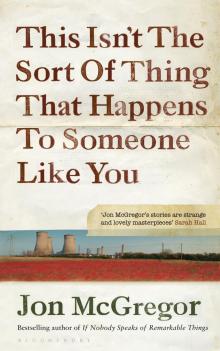 This Isn't the Sort of Thing That Happens to Someone Like You
This Isn't the Sort of Thing That Happens to Someone Like You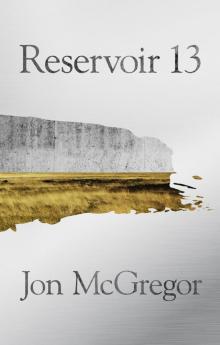 Reservoir 13
Reservoir 13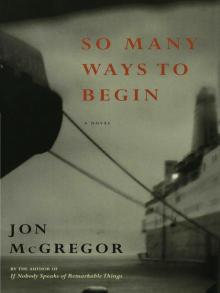 So Many Ways to Begin
So Many Ways to Begin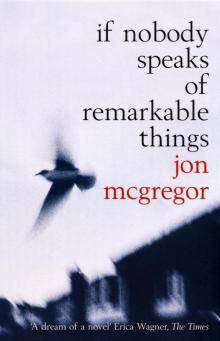 If Nobody Speaks of Remarkable Things
If Nobody Speaks of Remarkable Things The Reservoir Tapes
The Reservoir Tapes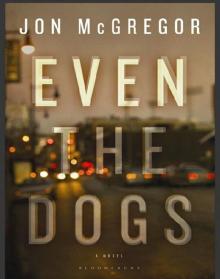 Even the Dogs: A Novel
Even the Dogs: A Novel